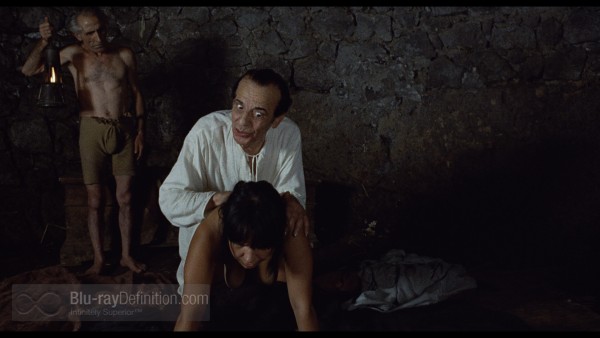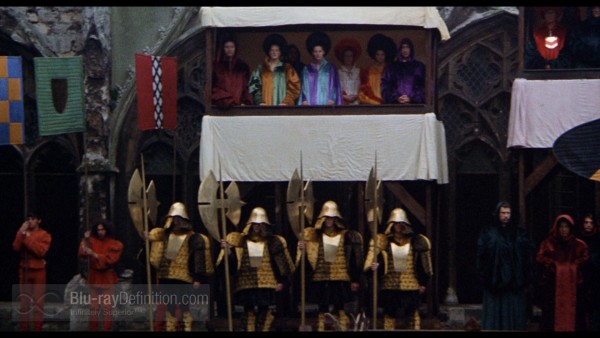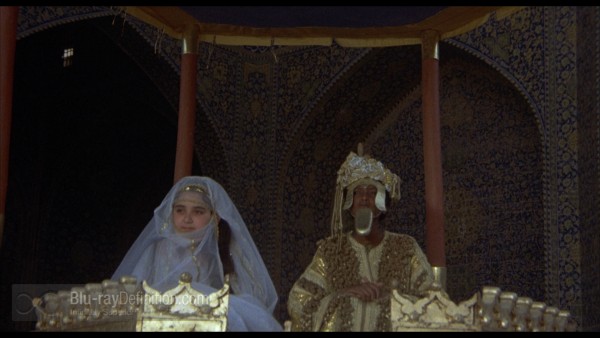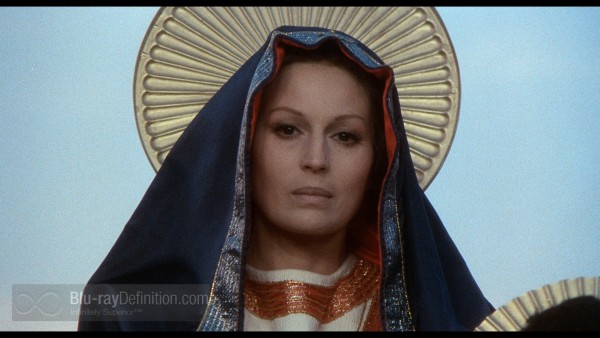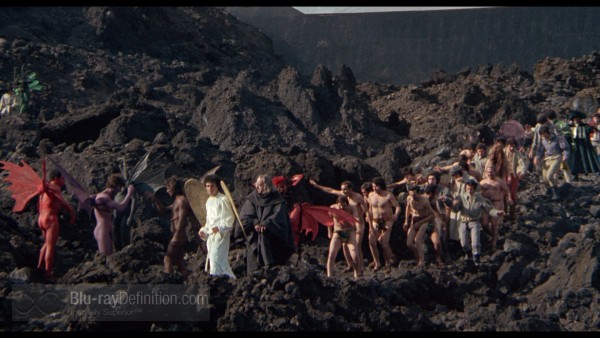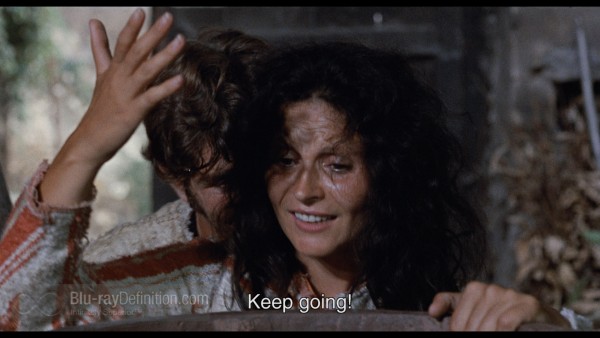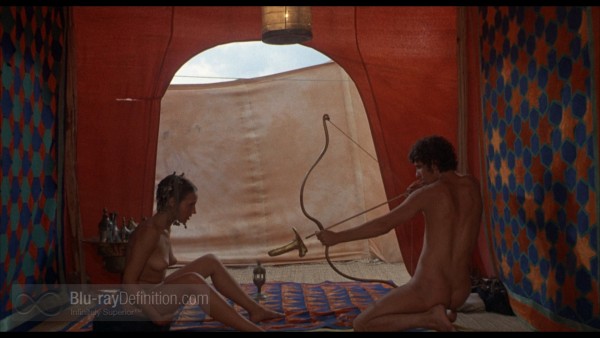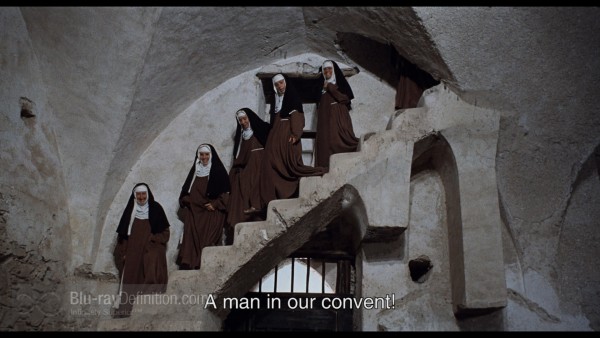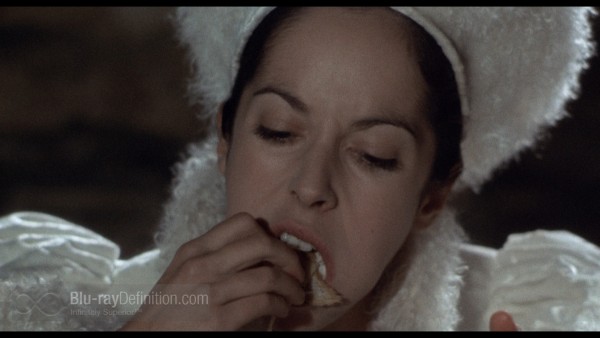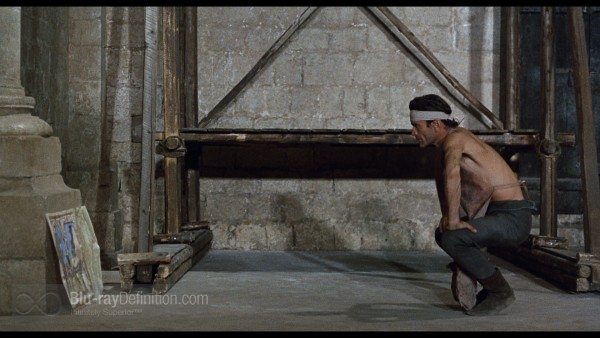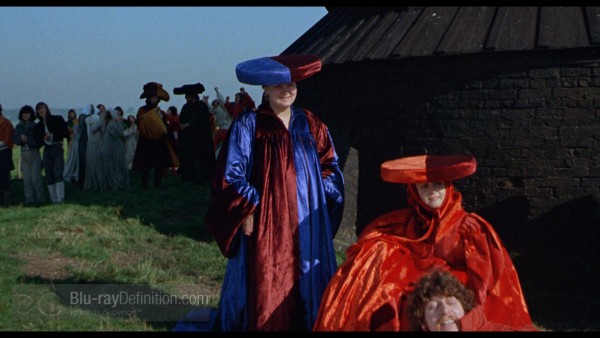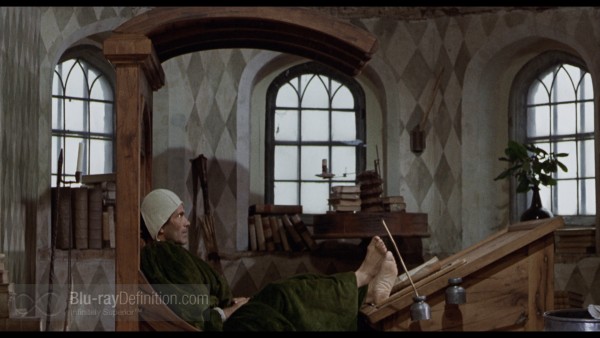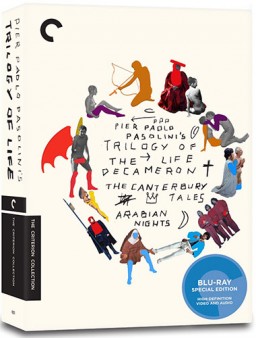

- Aspect Ratio: 1.85:1
- Video Codec: AVC/MPEG-4
- Resolution: 1080p/24
- Audio Codec: LPCM Mono
- Subtitles: English
- Rating: NR
- Discs: 3 (3 x Blu-ray)
- Studio: Criterion Collection
- Blu-ray Release Date: November 13, 2012
- List Price: $79.98
–
Overall
[Rating:3.5/5]
The Film
[Rating:3.5/5]
Video Quality
[Rating:3.5/5]
Audio Quality
[Rating:3/5]
Supplemental Materials
[Rating:4.5/5]
Click thumbnails for high-resolution 1920X1080p screen captures
(All TheaterByte screen captures are lightly compressed with lossy JPEG at 100% quality setting and are meant as a general representation of the content. They do not fully reveal the capabilities of the Blu-ray format)
–
The Film
[Rating:3.5/5]
Italian director Pier Paolo Pasolini reinvents three classic collections of stories in his Trilogy of Life: Bocaccio’s Decameron, Chaucer’s Canterbury Tales, and the Arabian Nights. These films take considerable liberties with the original sources, often emphasizing their crude humor and lewd behavior. Two of the Trilogy, the Decameron and Arabian Nights are Italian-only films but non-Italian speakers should not worry, the updated subtitles are quite decent. By way of advance warning, all of these films are loaded with nudity, explicit sex, and homoeroticism that should have easily qualified them for “R” ratings.
The Decameron (1971)
Nine of the one hundred original stories make up The Decameron, now relocated from Florence to Naples. As the film opens, a naïve young man (Franco Citti who appears in all three films) is swindled and unceremoniously tossed in the crapper. Other tales include the sexual adventures of some horny nuns, a painter (played by Pasolini) seeking “divine” inspiration for a church mural, and the question of life after death caused by excessive sex. The Decameron has a pretty earthy looking cast of mostly nonprofessional actors (with lots of bad teeth).
The Canterbury Tales (1972)
Pasolini (as Chaucer) relates eight of the Canterbury tales. The cast has a slew of good English actors and an optional English language soundtrack (approved by Pasolini). The opening story, the Merchant’s Tale, is also the best of the lot with the redoubtable Hugh Griffith (old Sir January) and Josephine Chaplin (his young wife May) in a classic misalliance. Among the other stories are the immolation of a homosexual man too poor to buy his pardon from the Church, a Chaplinesque Cook’s Tale and the Wife of Bath portrayed as the original black widow.
Arabian Nights (1974)
“The Flower of One Thousand and One Nights,” (its Italian title) is the best realized film of the group. We are given the story of the young boy Nureddin (Franco Merli) and his slave girl Zumurrud (Ines Pellegrini) who begins the story-telling. When she is abducted, Nureddin goes off to find her. Zumurrud, now disguised as a man, suddenly becomes ruler of a distant land, and we get more tales of the Arabian Nights. The longest and most complex is the sobering account of Aziz, a young man who gets sidetracked on his wedding day by a beautiful girl; the shortest involves another young man who pursues the girl of his dreams who is a legendary man-hater. As the tales end, Nureddin and Zumurrud are reunited.
Video Quality
[Rating:3.5/5]
The Decameron and The Canterbury Tales received digital transfers in 2K resolution on a Scanity film scanner while Arabian Nights got its makeover on a Spirit Datacine from their original 35 mm interpositive. These films are reasonably well restored but do exhibit some residual grain and softness of detail. A vertical black line creeps into some frames of the Canterbury Tales, probably an artifact from the original master. The period costumes and sets that create the eras of the stories make for great viewing, with the many varied locations of the Arabian Nights being the most picturesque.
Audio Quality
[Rating:3/5]
The mono soundtracks received 24-bit digital reconditioning from either 35 mm magnetic or optical sources. They are still boxy but sound quite clear with very little snap, crackle or pop. Dialogue is crisp and the musical scores by Ennio Morricone are perfectly suited to their respective subject matters.
Supplemental Materials
[Rating:4.5/5]
The Criterion Collection is very generous with extras:
- Visual essays by film scholars Patrick Rumble (The Decameron) and Tony Rayns (Arabian Nights).
- New interviews with production designer Dante Ferretii, composer Ennio Morricone, and film scolar Sam Rohdie
- Pasolini’s introduction to Arabian Nights
- The Lost Book of Alibech: documentary by Roberto Chiesi about a lost sequence from the original filming of The Decameron (no actual footage is presented)
- Pasolini and the Secret Humiliation of Chaucer: another Chiesi documentary about The Canterbury Tales
- Via Pasolini: a documentary with archival footage of Pasolini holding forth on films, language and modern society.
- Pasolini and the Form of the City: a documentary by Pasolini and Paolo Burnatto about the Italian cities Orte and Sabaudia
- Deleted scenes from Arabian Nights
- Theatrical Trailers
- A booklet with essays on each film by critic Colin MacCabe and Pasolini’s so-called “rejection” letter for the Trilogy, excerpts from a Pasolini interview at the Berlin Film Festival showing of The Canterbury Tales, and critic Gideon Bachmann’s report from the set of Arabian Nights
These supplements are interesting watches and reads in their own right and add substantial background information to the Trilogy and its creator.
The Definitive Word
Overall:
[Rating:3.5/5]
Pasolini, a filmmaker, philosopher, and poet, was murdered in 1975 so his censorship-flaunting films may be unknown to contemporary film audiences. He had leftist leanings, an openly gay lifestyle, and unvarnished contempt for the bourgeoisie. That aside, Pasolini was a gifted artist whose films proclaimed his personal views on society. The Trilogy of Life broke through a lot of conventional barriers, displaying a contemptuous disregard for ratings. While human sexuality takes numerous literal and figurative shots below the belt, Pasolini also takes dead aim at other elements of society, clergy, artists, gays, business folk, faithless spouses and randy youths. Doubtless, some viewers may be offended by the continued outpouring of nudity and sex shown in these films. However, moviegoers who approach the Trilogy with open minds will find something to enjoy in each of these well-directed, well-scripted and, on occasion, unabashedly humorous films.
Additional Screen Captures
[amazon-product]B008Y5OWKW[/amazon-product]
Purchase Trilogy of Life [Criterion Collection] on Blu-ray at CD Universe
Shop for more Blu-ray titles at Amazon.com
–
[amazon-product]B008Y5OWKW[/amazon-product]
Purchase Trilogy of Life [Criterion Collection] on Blu-ray at CD Universe
Shop for more Blu-ray titles at Amazon.com
Overall
[Rating:3.5/5]
The Film
[Rating:3.5/5]
Video Quality
[Rating:3.5/5]
Audio Quality
[Rating:3/5]
Supplemental Materials
[Rating:4.5/5]
–



